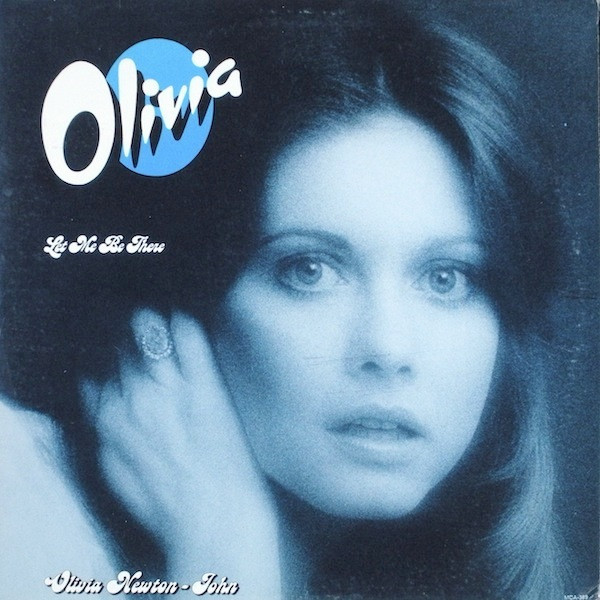DOLLY YOUR ENTHUSIASM (4)
By:
January 11, 2023
One in a series of 25 enthusiastic posts, contributed by 25 HILOBROW friends and regulars, on the topic of favorite Country singles from the Sixties (1964–1973). Series edited by Josh Glenn. BONUS: Check out the DOLLY YOUR ENTHUSIASM playlist on Spotify.

OLIVIA NEWTON-JOHN | “LET ME BE THERE” | 1973
“Let Me Be There,” a Grammy-winning song by future Country Music Association Award winner and soft goddess Olivia Newton John, helped delineate the edges of Country as a genre, and Country as an exercise in taste. This was an especially difficult task c. 1973, during an era that saw Country’s musical expansion suffer genuine backlash.
The song was beloved by Nashville. Tanya Tucker recorded it for her album Would You Lay with Me (In a Field of Stone), and Elvis performed it live, including in a 1974 Memphis concert. It showed up on Ike and Tina Turner’s Sweet Rhode Island Red, and on Conway Twitty and Loretta Lynn’s Feelins’. This is kind of how the genre worked: a song would become significant or big, and then it would be covered, passed around, and extinguished all in a couple of years’ time.
Newton-John’s Let Me Be There album, a melange of covers and folk songs, hints at the identity crisis that the Country genre was going through. The US release included “Me and Bobby McGee,” the murder ballad “Banks of the Ohio,” and the least haunting version ever of “Help Me Make It Through the Night.” Newton-John was soft, she lacked angst… but at the time Country was in the middle of an angst crisis. Every so often Country decides that it needs to be harder — meaning more butch, more masc — and so we get movements like “Outlaw Country” that prioritize men over women. The press was only interested in “Outlaw” when Newton-John released “Let Me Be There,” a delicate, permission-asking, almost lacy ode to obsessive desire.
“Let Me Be There” sounds country: It has the pedal steel, the little catch of an Australian accent that reads as twang, the soft structure and louder chorus. But it is sentimental, and unapologetic about its sentimentality. Which lends itself to ambiguity — is she a lover addressing another lover, a parent addressing a child, a friend addressing a friend (as the song’s third voice, which says that she can be leaned on, suggests)? The lyrics become less ambiguous when they mention “a wonderland that only two can share”; perhaps this might be a cheating song.
Rather than focus only on masterpieces, when we discuss what defines the Country genre, I’m fascinated by songs like this one — successful, but we don’t remember it. It was part of the conversation only at a certain moment. This isn’t even Newton-John’s best Country song! But when it comes to helping us interrogate received notions about what “Country” meant in and around 1973, it’s more useful than a masterpiece. Masterpieces are for chumps. The soft, ingratiating pleasure of “Let Me Be There” gives us critics something new to consider, something new to defend.
DOLLY YOUR ENTHUSIASM: INTRODUCTION by Josh Glenn | David Cantwell on Porter Wagoner and Dolly Parton’s WE FOUND IT | Lucy Sante on Johnny & June Carter Cash’s JACKSON | Mimi Lipson on George Jones’s WALK THROUGH THIS WORLD WITH ME | Steacy Easton on Olivia Newton-John’s LET ME BE THERE | Annie Zaleski on Tammy Wynette’s D-I-V-O-R-C-E | Carl Wilson on Tom T. Hall’s THAT’S HOW I GOT TO MEMPHIS | Josh Glenn on Commander Cody and His Lost Planet Airmen’s BACK TO TENNESSEE | Elizabeth Nelson on Skeeter Davis’s I DIDN’T CRY TODAY | Carlo Rotella on Buck Owens’ TOGETHER AGAIN | Lynn Peril on Roger Miller’s THE MOON IS HIGH | Erik Davis on Kris Kristofferson’s SUNDAY MORNIN’ COMIN’ DOWN | Francesca Royster on Linda Martell’s BAD CASE OF THE BLUES | Amanda Martinez on Bobbie Gentry’s FANCY | Erin Osmon on John Prine’s PARADISE | Douglas Wolk on The Byrds’ DRUG STORE TRUCK DRIVIN’ MAN | David Warner on Willie Nelson’s WHISKEY RIVER | Will Groff on Tanya Tucker’s DELTA DAWN | Natalie Weiner on Dolly Parton’s IN THE GOOD OLD DAYS (WHEN TIMES WERE BAD) | Charlie Mitchell on Stonewall Jackson’s I WASHED MY HANDS IN MUDDY WATER | Nadine Hubbs on Dolly Parton’s COAT OF MANY COLORS | Jada Watson on Loretta Lynn’s DON’T COME HOME A DRINKIN’ (WITH LOVIN’ ON YOUR MIND) | Adam McGovern on Johnny Cash’s THE MAN IN BLACK | Stephen Thomas Erlewine on Dick Curless’s A TOMBSTONE EVERY MILE | Alan Scherstuhl on Waylon Jennings’s GOOD HEARTED WOMAN | Alex Brook Lynn on Bobby Bare’s THE WINNER. PLUS: Peter Doyle on Jerry Reed’s GUITAR MAN | Brian Berger on Charley Pride’s IS ANYBODY GOING TO SAN ANTONE.
JACK KIRBY PANELS | CAPTAIN KIRK SCENES | OLD-SCHOOL HIP HOP | TYPEFACES | NEW WAVE | SQUADS | PUNK | NEO-NOIR MOVIES | COMICS | SCI-FI MOVIES | SIDEKICKS | CARTOONS | TV DEATHS | COUNTRY | PROTO-PUNK | METAL | & more enthusiasms!
